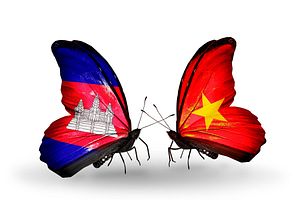Cambodia and Vietnam have vowed to boost bilateral ties following a state visit by Vietnamese president Truong Tan Sang and a high-level delegation at the invitation of Cambodian king Norodom Sihamoni from December 23 to 24.
Both sides committed to developing their relationship and enhancing comprehensive cooperation in various meetings held during Sang’s visit. Economically, they pledged to follow through on an earlier commitment to boost two-way investment and to take bilateral cooperation to $5 billion by 2015. They also said they would strengthen collaboration in areas like tourism and petroleum and fine tune their legal systems to create a framework for trade and investment.
Vietnam is already a major trade partner and investor in Cambodia. According to the Cambodian Chamber of Commerce, Vietnam is Cambodia’s sixth largest trading partner and its tenth largest foreign investor (though some suggest the figures, particularly on investment, understate Hanoi’s influence). Bilateral trade is forecast to top $3.5 billion this year, and Vietnam already has more than 130 projects in Cambodia worth more than $3 billion, predominantly in certain fields such as rubber, fertilizer, banking, aviation and telecommunications.
Security-wise, both sides agreed to push for an early completion of efforts to demarcate and plant markers along their 700-mile long border. In a related development, Cambodia and Vietnam conducted their fourth joint workshop on reviewing ongoing efforts to demarcate their shared border.
To further people-to-people ties, Vietnam and Cambodia agreed to increase communication campaigns to educate the younger generations on the strong tradition of friendship and cooperation between the two countries. They also discussed the issue of Vietnamese immigrants in Cambodia. In an interview prior to his visit with Rasmei Kampuchea, the largest Khmer language daily in Cambodia, Sang also promised that Vietnam would provide more scholarships for Cambodian students studying in Vietnam.
Both sides also paid tribute to the historical significance of the relationship. Cambodian prime minister Hun Sen once again thanked Vietnam for its role in helping liberate his country from the Khmer Rouge, reiterating that there would be no Cambodia as it is today without Hanoi’s assistance. Hun Sen was referring to the Vietnamese invasion of Cambodia, when Vietnamese troops seized Phnom Penh on January 7, 1979 and toppled the genocidal Khmer Rouge regime led by Pol Pot which had killed millions of people after its ascent to power in 1975. Hun Sen’s account predictably did not emphasize Vietnam’s subsequent occupation of Cambodia, which lasted about a decade and still inspires mixed reactions today.
The two sides also reviewed and discussed regional and international issues of mutual concern. They said they would continue to cooperate in forums such as the Association of Southeast Asian Nations and the United Nations and collaborate with other members of the Mekong River Commission to ensure sustainable management of that river.
Meanwhile, The Phnom Penh Post reported that the topic of Montagnards from Vietnam seeking asylum in Cambodia was conspicuously absent from the two-hour meeting between the heads of state.
“The meeting did not focus on any problem, it was just a ceremonial meeting. They did not focus on the 13 Montagnards or on any issue,” Eang Sophalleth, personal assistant to Hun Sen was quoted by the newspaper as saying.
This was Sang’s first official trip to Cambodia since he became head of state. During his visit, he also invited both Sihamoni and Hun Sen to visit Vietnam in the future.
































